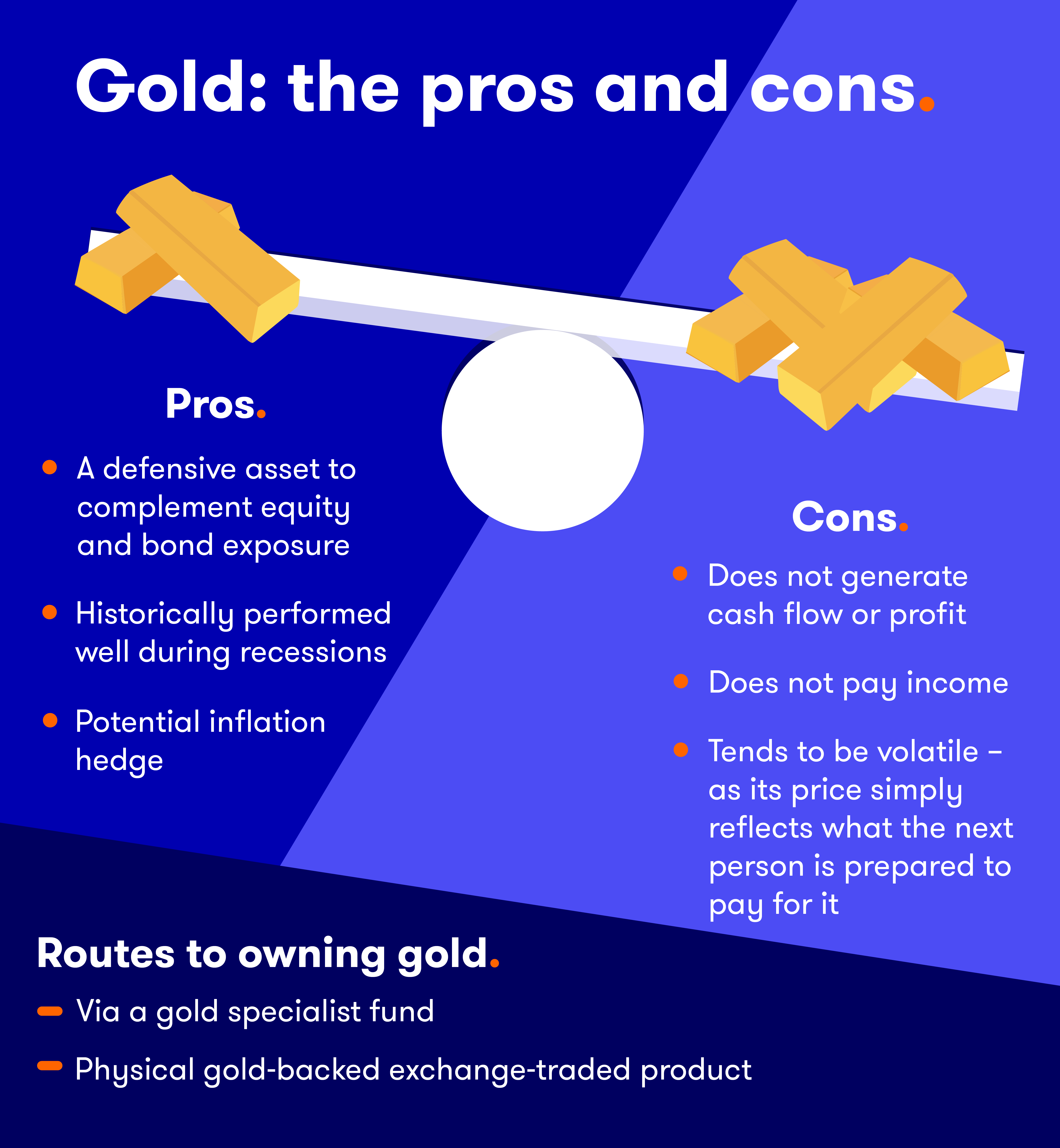Private investors shunning gold miss out on price rally
While gold enjoyed a strong end to 2023 and prospects for the year ahead look rosier, private investors have so far been keeping their powder dry. Will gold glitter in 2024? Kyle Caldwell assesses the outlook.
8th January 2024 10:14
by Kyle Caldwell from interactive investor

Gold is a Marmite investment. On the one hand, some argue that a small weighting to gold is beneficial over the long term as a portfolio diversifier due to its ability to act as a safe haven in troubled times. Others, however, steer clear of the yellow metal due to price volatility and the lack of a dividend.
For those investors who are fans and had exposure to gold, it was a strong final quarter of 2023. According to fund manager Invesco, gold increased by 11.6% (in US dollar terms) over the quarter, while over the year it delivered a return of 13.1%.
Invesco said: “The metal hit a new all-time intraday high on 3 December of $2,135 as traders speculated on the US Federal Reserve exercising a much looser monetary policy.” It added that gold ended December at $2,063.
This was driven by expectations that rising interest rates, a big headwind for gold, will soften in 2024. As rates go up, the income on offer from safe government bonds – such as those issued by the US or UK government – also increases. This makes gold less attractive to own compared to low-risk bonds, due to the metal not paying an income.
- Our Services: SIPP Account | Stocks & Shares ISA | See all Investment Accounts
However, despite gold hitting a record high in early December and the outlook for the metal for 2024 looking rosier due to possible interest rate cuts, private investors have not been catching the recent rally, notes BullionVault.
Adrian Ash, the firm’s director of research, points out that in 2023 gold saw the weakest level of private investing in a decade, according to its Gold Investor Index, which measures investor behaviour in the gold market.
Ash says that in contrast central banks have been heavy buyers of gold, which has been fuelling the recent rally.
He says: “The split in gold between private investment and central banks couldn’t be starker. While central banks are buying gold like it has returned as the lynchpin of the global monetary system, private investors are selling or shunning the precious metal as though it is stuck in a bear market. Despite last year’s dreadful geopolitical news, gold lacked urgency for private investors as global stock markets almost reversed 2022’s crash.
“High interest rates and record-high gold prices are deterring new buyers, while inviting continued profit-taking among existing investors.
“In contrast, central banks led by China continue buying gold regardless of price, seeking to de-dollarise their foreign reserves to spread risk and reduce the risk of exposure to US sanctions. That highlights the worsening mistrust and tension between major powers ahead of 2024’s US election.”
- Eight key things for investors to watch in 2024
- Funds and trusts yielding more than cash that the pros are backing
Ash is optimistic that gold demand will pick up as the US Federal Reserve starts cutting interest rates. He adds that “a more marked rebound will probably need fresh urgency from a geopolitical, economic or financial shock”.
Invesco points out that geopolitical tensions and uncertainty could benefit the gold price in 2024, leading investors to tap into the metal for its safe-haven qualities.
It notes that with geopolitical factors there “is the possibility they could increase in 2024 as the conflict in the Middle East could widen and, in the year ahead, an estimated 41% of the world’s population will see a national election. This increases the opportunity for political disruption from which gold could benefit.”
Gold’s safe-haven status is down to the metal being a tangible asset and a reliable store of value. This is because governments and central banks cannot simply print more gold, as they can currencies. As a result, its value is preserved.
With gold, be mindful that – like all commodities – its price can fluctuate rapidly. Also remember that the US dollar influences the gold price. When the dollar rises, gold and silver become more expensive for international investors to buy due to both being dollar-denominated commodities. However, the consensus is that rate cuts will cause the US dollar to weaken in 2024, which would represent a tailwind for gold.

Routes to owning gold
Gold specialist funds or exchange-traded funds (ETFs) and exchange-traded commodity (ETCs) offer exposure to gold.
Equity-based commodity ETFs invest in shares of commodity companies, whereas ETCs are instruments that track the price of the commodity, or a basket of commodities. Both are passive, meaning they follow the up and down fortunes of an index rather than actively making decisions on which companies are best placed to gain exposure to gold.
Two active fund options are BlackRock World Mining Trust (LSE:BRWM) and Jupiter Gold & Silver. Whereas, for passive exposure, options include iShares Physical Gold ETC (LSE:SGLN), WisdomTree Physical Gold (LSE:PHAU) and Royal Mint Responsibly Sourced Physical Gold ETC (LSE:RMAP).
- Why you should think twice about making a big move to cash
- How fund manager predictions fared in 2023 – and forecasts for next year
For broader exposure to commodities, WisdomTree Enhanced Commodity ETF (LSE:WCOG) is a member of interactive investor’s Super 60 list of investment ideas.
Dzmitry Lipski, head of funds research at interactive investor, says: “The outlook for commodities is somewhat positive given the possibility that the US Federal Reserve will start to ease monetary policy [and] lower rates and expectations for a weaker US dollar should be positive for commodities priced in US dollars. In addition, heightened geopolitical risks and still strong demand for ‘clean’ energy metals should support commodity prices going forward.
“WisdomTree Enhanced Commodity ETF offers investors a broad and diversified commodity exposure, covering major commodity sectors such as industrial metals, precious metals, energy and agriculture.”
These articles are provided for information purposes only. Occasionally, an opinion about whether to buy or sell a specific investment may be provided by third parties. The content is not intended to be a personal recommendation to buy or sell any financial instrument or product, or to adopt any investment strategy as it is not provided based on an assessment of your investing knowledge and experience, your financial situation or your investment objectives. The value of your investments, and the income derived from them, may go down as well as up. You may not get back all the money that you invest. The investments referred to in this article may not be suitable for all investors, and if in doubt, an investor should seek advice from a qualified investment adviser.
Full performance can be found on the company or index summary page on the interactive investor website. Simply click on the company's or index name highlighted in the article.